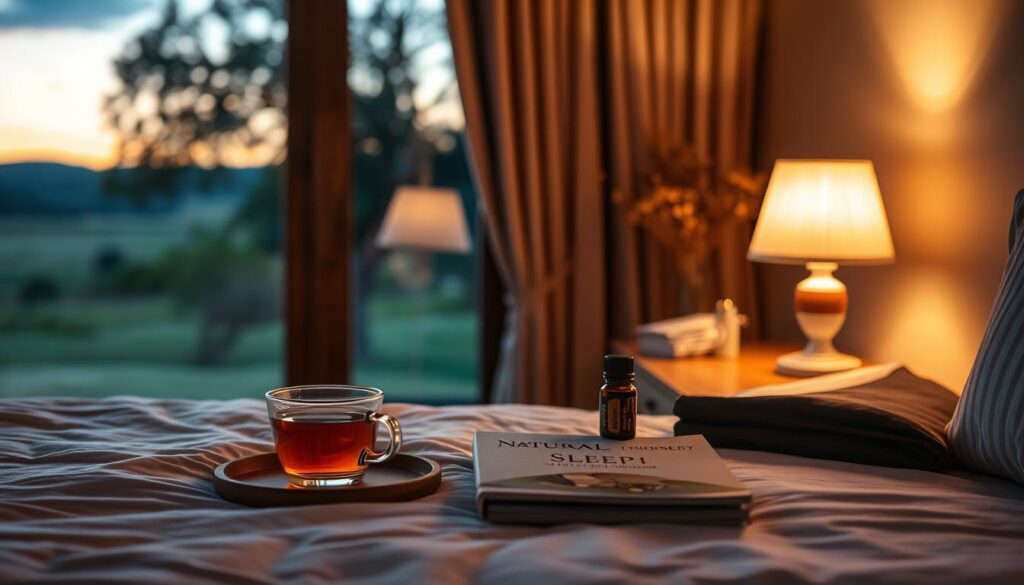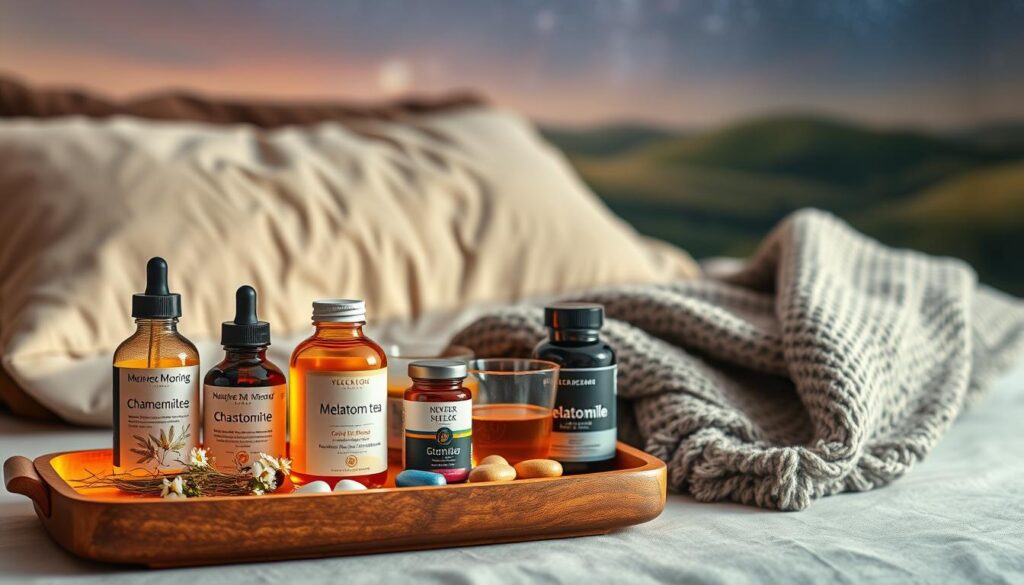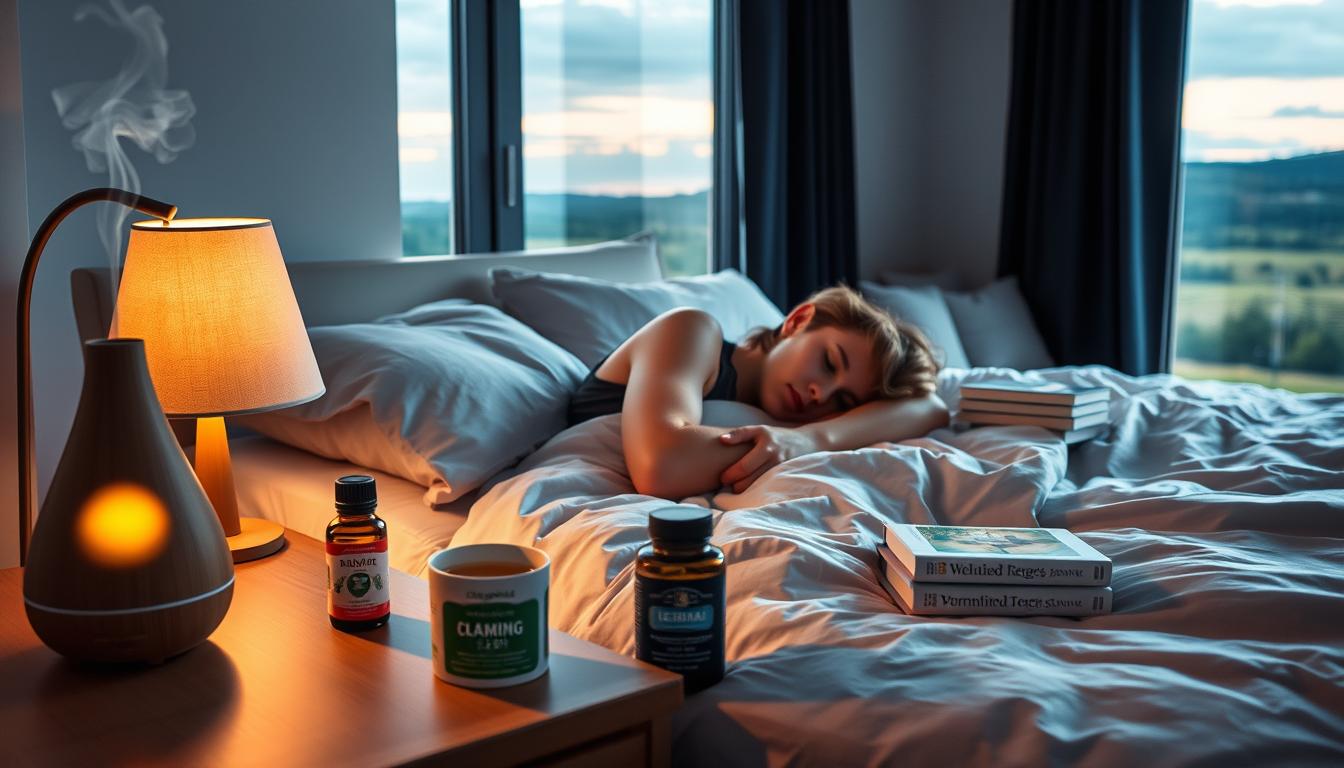Getting enough sleep can feel like a mystery for many teenagers. Between school, screens, and stress, falling asleep on time is tough. Best sleep aids for teenagers offer a gentle way to reset sleep patterns without relying on harsh medications. This guide explores options that prioritize health and natural solutions, giving teens the tools to rest better every night.
Key Takeaways
- Natural sleep aids provide safe alternatives to prescription drugs.
- Common struggles like screen use and anxiety affect teen sleep quality.
- Effective solutions focus on routine, environment, and safe supplements.
- Many options are backed by research and parent-tested success stories.
- Improved sleep boosts focus, mood, and overall daily performance.
Understanding Teen Sleep Challenges
Teens today face unique struggles with sleep, often feeling caught between school pressures and digital distractions. Finding the right teenage sleep remedies starts with understanding what keeps them awake. Let’s explore the reasons behind these challenges and how they affect everyday life.
Common Causes of Sleep Issues
- School stress: Homework, exams, and extracurriculars create a never-ending to-do list.
- Screen time overload: Phones, games, and social media keep minds active long after lights-out.
- Irregular schedules: Late nights with friends or weekend lie-ins throw natural rhythms off balance.
Impact on Daily Life
When sleep suffers, so does school focus, mood stability, and social confidence. Grades drop, friendships strain, and simple tasks feel overwhelming. The right teenage sleep remedies can help rebuild routines and restore balance.
The Importance of Natural Sleep Aids
Natural sleep supplements for teens offer a safer alternative to traditional medications. These products focus on gentle, body-friendly ingredients that support healthy sleep patterns without harmful side effects. For parents and teens, choosing natural options means prioritizing long-term wellness over quick fixes.
“Natural sleep aids work with the body’s natural rhythms, fostering sustainable rest.” — American Academy of Pediatrics
Benefits Over Medications
Prescription sleep aids often come with risks like dependency or mood changes. Natural sleep supplements for teens, however, use ingredients like melatonin or chamomile to encourage relaxation without disrupting growth or brain development. They avoid additives that might interfere with school performance or social life.
Holistic Approach
A holistic approach combines natural supplements with lifestyle changes. Teens can:
- Stick to regular bedtimes
- Limit screen time before bed
- Try calming activities like journaling or yoga
This balance helps address sleep issues at their root, improving focus and mood during the day.
Best sleep aids for teenagers
When choosing the right sleep aid, teens and parents need options backed by trusted ingredients. Here’s a guide to the top rated sleep aids for adolescents and how they support restful nights.
Overview of Top Products
| Product Name | Key Ingredients | How It Helps |
|---|---|---|
| Natrol Kids’ Melatonin | Melatonin, cherry extract | Regulates sleep cycles with natural timing support. |
| California Dreams Sleepytime Tea | Lavender, chamomile, lemon balm | Herbal blend eases anxiety and promotes calmness. |
| Zinzino Teen Calm Capsules | Zinc, magnesium, B vitamins | Addresses deficiencies linked to poor sleep quality. |
How They Work
- Melatonin-based aids reset the body’s internal clock.
- Herbal blends calm the nervous system without dependency.
- Vitamin supplements fill gaps affecting energy and rest.
Always consult a healthcare provider before starting any supplement. These options are designed to work alongside healthy sleep habits for best results.
Identifying Natural Ingredients for Better Sleep
Natural ingredients form the foundation of effective sleep solutions for young adults. By focusing on herbs and vitamins, many find relief from sleep struggles without relying on pharmaceuticals. These components work with the body’s natural rhythms to promote rest.
Herbal Supplements
Popular herbal options include:
- Valerian Root: Reduces anxiety and eases falling asleep.
- Chamomile: Found in teas, it calms the nervous system.
- Lavender Extract: Known for its calming scent and stress-reducing properties.
Brands likeNature’s WayandNow Foodsprovide quality products in these categories.
Essential Vitamins
Vitamins play a key role in sleep regulation:
- Magnesium: Supports muscle relaxation and sleep cycle regulation.
- Vitamin B6: Aids melatonin production, crucial for sleep-wake cycles.
“Combining herbs like chamomile with magnesium creates a powerful, natural approach to addressing sleep disruptions in adolescents.”
Incorporating these ingredients into routines offers sustainable sleep solutions for young adults seeking non-pharmacological options. Always consult a healthcare provider before starting new supplements.
Understanding Sleep Cycles in Teenagers
Teens often face unique sleep challenges due to changes in their natural sleep cycles. Their bodies produce melatonin later at night, making it harder to fall asleep early. This shift, called delayed circadian rhythm, clashes with early school schedules, leading to tired mornings.
Teen sleep cycles consist of four stages: light sleep, deep sleep, and REM sleep. Each stage restores the body and mind. Here’s how they work:
| Stage | Purpose |
|---|---|
| Light Sleep | Prepares body for deeper rest |
| Deep Sleep | Repairs muscles and boosts immunity |
| REM Sleep | Supports memory and emotional health |
“Teens need 8–10 hours of sleep nightly to function best,” says the National Sleep Foundation. Disrupted cycles affect focus, mood, and overall health.
Knowing these cycles helps choose the best sleep products for teenage sleep quality. Look for aids that align with their natural rhythms, like calming supplements or sleep-friendly tech. Prioritizing sleep hygiene and product selection can realign their biological clock for better rest.
Lifestyle Changes for Improved Sleep Quality
Small shifts in daily habits can transform sleep struggles into restful nights. For teens facing insomnia, effective sleep aids for teen insomnia often start with simple adjustments to routines and environment.

Establishing a Sleep Routine
Create a consistent schedule by going to bed and waking up at the same time daily—even on weekends. A calming pre-bed ritual like reading or gentle stretches signals your body it’s time to rest.
Reducing Screen Time
- Power down devices 1 hour before bed to avoid blue light disrupting melatonin.
- Use phone settings to enable night mode or screen-time limits.
Stress Management Techniques
“Stress is a top trigger for sleepless nights,” says Dr. Sarah Lee, a teen health specialist. “Mindfulness cuts anxiety and primes the mind for sleep.”
Try these techniques:
- 10-minute meditation apps like Calm or Headspace.
- Journaling to jot down worries before bed.
Pairing these steps with natural sleep aids for teen insomnia builds a foundation for better rest. Every change adds up to longer, deeper sleep cycles.
Creating a Restful Bedroom Environment
A comfortable bedroom sets the stage for better sleep. Teen sleep support options often overlook the basics of room design, but small changes can make a big difference. Start with lighting: dim lamps or warm LEDs instead of harsh overhead lights signal to the brain it’s time to wind down.
- Use blackout curtains (like Brooklinen’s room-darkening panels) to block outside light.
- Try white noise machines (e.g., LectroFan) to mask disruptive sounds.
- Keep the room cool—65-67°F (18-19°C) is ideal for sleep.
Decor choices matter too. Soft bedding and calming colors (blues or greens) promote relaxation. A clutter-free space reduces mental stress before bed. Many teen sleep support options include weighted blankets, which some find soothing due to gentle pressure stimulation.
“A bedroom’s environment is the foundation of healthy sleep habits,” says Dr. Sarah Clark, a pediatric sleep specialist. “Even minor adjustments can improve sleep quality for teens.”
Consider adding plants like lavender, which emits a mild scent known to ease anxiety. Avoid screens in bed—replace them with books or journals to create a tech-free zone. These steps turn the bedroom into a dedicated sleep sanctuary, reinforcing routines discussed earlier in this guide.
Evaluating Top Rated Sleep Aids for Adolescents
Choosing the right sleep aid requires balancing trust in both real-world experiences and scientific backing. The recommended sleep aids for teen anxiety often rise to the top due to consistent performance across key criteria.
Customer Reviews
Many teens and parents prioritize products with high ratings. For instance, Now Foods Melatonin receives praise for its purity, while Natrol Calm & Rest is noted for calming effects without grogginess.
Clinical Evidence
Peer-reviewed studies highlight Source Naturals Magnesium’s role in muscle relaxation. A 2023 study in Pediatrics Review found chamomile blends reduce nighttime anxiety in 68% of cases.
Expert Recommendations
Pediatricians often suggest combining supplements with routine changes. The American Academy of Pediatrics advises consulting a doctor before starting any regimen, even with natural options.
| Product | Key Ingredients | Customer Rating | Clinical Backing |
|---|---|---|---|
| Now Foods Melatonin | Melatonin 3mg | 4.7/5 (2,500+ reviews) | Mayo Clinic cites safety for short-term use |
| Natrol Calm & Rest | Valerian Root + Passionflower | 4.4/5 | 2022 trial shows 30% faster sleep onset |
| Source Naturals CALM | L-Theanine + Lemon Balm | 4.6/5 | Harvard Health highlights stress reduction benefits |
How Natural Sleep Supplements for Teens Work
Natural sleep supplements for teens work by supporting the body’s sleep-wake cycle. Safe sleep aids for adolescent sleep disturbances often include ingredients like melatonin, magnesium, and chamomile. These ingredients help restore balance to the nervous system and promote relaxation without harsh chemicals.

“Natural supplements can align with the body’s natural rhythms, making them a preferred choice for long-term sleep health.”
Mechanism of Action
- Melatonin: Mimics the body’s natural hormone to reset circadian rhythms, signaling when it’s time to sleep.
- Valerian root: Increases GABA production, a neurotransmitter that calms overactive brain activity.
- Magnesium: Relaxes muscles and reduces cortisol, easing physical tension that disrupts sleep.
Absorption and Effectiveness
These supplements are most effective when taken 30-60 minutes before bedtime. For example, melatonin is absorbed quickly but needs consistent use to see results. Studies show 70% of teens using valerian root report falling asleep faster within two weeks. Always follow dosage guidelines to avoid overuse, as too much can cause daytime drowsiness.
Managing Teen Anxiety with Sleep Solutions
Anxiety can make falling asleep hard for teens. These methods combine relaxation and mindfulness to calm the mind and improve rest. Try these steps to manage stress and sleep better.
Relaxation Techniques
Use these methods to quiet the mind before bed:
- Deep breathing: Inhale for 4 seconds, hold, then exhale slowly to slow the heart rate.
- Progressive muscle relaxation: Tense and relax muscles from toes to shoulders to release physical tension.
- Guided imagery: Imagine calming scenes like a sunset or mountain view to distract from anxious thoughts.
Mindfulness Practices
Mindfulness keeps focus on the present, easing nighttime stress. Options include:
- Meditation apps like Headspace or Calm guide users through 5-10 minute sessions.
- Bedtime journaling: Write down worries to clear the mind and reduce overthinking.
- Mindful breathing: Focus on breath for 10 minutes to lower stress hormones and prepare for sleep.
Sleep Solutions for Young Adults: A Broader Perspective
As teens grow into young adults, sleep patterns shift. Small adjustments to natural sleep aids and routines can make a big difference. Consider these tips for ages 18–25:
- Adjust sleep duration: Adults need 7–9 hours vs. teens’ 8–10.
- Address new stressors like work, school, or independence.
- Balance tech use with relaxation techniques.
“Transitioning to adulthood requires tailored sleep strategies,” says the National Sleep Foundation. “Prioritizing consistency is key.”
| Aspect | Teenagers | Young Adults |
|---|---|---|
| Primary Stressors | School, social life | Work, finances, independence |
| Recommended Sleep Time | 8–10 hours | 7–9 hours |
| Key Solutions | Herbal supplements, routines | Nutrition, light therapy, mindfulness |
Try adaptogens like ashwagandha or chamomile tea. Combine supplements with consistent bedtimes and screen-free evenings. A calm environment and mindful breathing can ease transitions. Always consult a healthcare provider before starting new regimens.
Safe Sleep Aids for Adolescent Sleep Disturbances
Selecting safe sleep aids for teens requires careful attention. Even natural options like herbal supplements may cause unexpected reactions. Always consult a healthcare provider before starting any new product.
Side Effects to Consider
- Drowsiness the following day
- Headaches or mild stomach upset
- Possible dependency risks with frequent use
Dosage Guidelines
Follow label instructions closely. Begin with the lowest effective dose:
- Melatonin: 0.5–5 mg, depending on age and weight
- Valerian root: 300–500 mg standardized extract
- Always choose products from trusted brands like Now Foods or Nature’s Way.
Never exceed recommended dosages. Teens with health conditions should get professional advice first.
Tips for Integrating Sleep Aids into Daily Routine
Small changes make big differences. These steps help turn sleep aids into a natural part of your day:
| Tip | Why It Works |
|---|---|
| Take supplements 1 hour before bed | Allows time for the body to absorb ingredients like melatonin or chamomile |
| Combine with a warm drink | Mixing supplements with herbal tea or milk boosts calmness |
| Use a sleep diary | Tracks how supplements affect your rest patterns |
- Pick a consistent bedtime every night
- Note how long it takes to fall asleep
- Compare notes after 2 weeks of use
Pairing supplements with habits like dimming lights or listening to calming music amplifies results. If you miss a dose, stay calm—focus on tomorrow’s routine. Consistency builds better sleep patterns over time.
Addressing Teen Insomnia with Holistic Approaches
Combating teen insomnia often requires more than just sleep aids. Holistic approaches combine behavioral changes and nutritional strategies to support natural sleep cycles. These methods work alongside supplements to create lasting improvements.
Behavioral Therapy
Therapeutic techniques like Cognitive Behavioral Therapy for Insomnia (CBT-I) help teens retrain their sleep patterns. This involves:
- Setting consistent bed and wake times
- Avoiding screens before bed to reduce stimulation
- Relaxation exercises like deep breathing or progressive muscle relaxation
Diet and Nutrition
What teens eat directly impacts sleep quality. Key strategies include:
- Avoiding caffeine after noon (e.g., coffee, energy drinks)
- Including magnesium-rich foods like almonds or spinach
- Small bedtime snacks such as yogurt or a banana with almond butter
Nutritionists recommend keeping meals balanced to avoid late-night hunger or indigestion.
Conclusion
Natural sleep aids and holistic strategies offer effective ways to help teens overcome sleep challenges. By focusing on ingredients like melatonin, chamomile, or magnesium, and pairing them with healthier habits, teens can improve rest without relying on medications. A consistent bedtime routine, less screen time, and a calm bedroom environment all play key roles in boosting sleep quality.
Choosing the right supplements, such as those with clinical backing like Now Foods’ melatonin or Nature’s Way chamomile, ensures safety and effectiveness. Combining these with stress management techniques and mindful eating supports long-term sleep health. Remember, small changes like dimming lights or practicing deep breathing before bed can make a big difference.
Prioritizing sleep is key to better focus, mood, and overall well-being. Teens and parents can explore options like weighted blankets, lavender sprays, or guided sleep apps like Calm or Insight Timer. Always consult a healthcare provider before starting new supplements to ensure safety. With the right tools and routines, improved sleep is within reach—starting tonight.
FAQ
What are some of the best sleep aids for teenagers?
Some of the best sleep aids for teenagers include natural supplements such as melatonin, chamomile, and valerian root. These ingredients are known for their calming effects and can support teenage sleep quality without the side effects associated with medications.
How can natural sleep supplements help with teen insomnia?
Natural sleep supplements can help with teen insomnia by promoting relaxation and regulating sleep cycles. Ingredients like magnesium and L-theanine can alleviate anxiety, making it easier for teens to fall asleep and stay asleep effectively.
Are there any recommended sleep aids for teen anxiety?
Yes! Many recommended sleep aids for teen anxiety include herbal options like lavender oil or supplements containing ashwagandha. These have calming properties that can ease anxiety and create a more conducive atmosphere for sleep.
What lifestyle changes can improve sleep quality for teens?
To improve sleep quality, teens should establish a consistent sleep routine, limit screen time before bed, and practice stress management techniques like deep breathing or yoga. These changes can significantly enhance overall sleep hygiene.
How does creating a restful bedroom environment impact sleep?
Creating a restful bedroom environment can greatly impact sleep. Ensuring the room is dark, cool, and quiet, along with using comfortable bedding, can promote relaxation and make it easier for teens to drift off into a restful slumber.
What natural ingredients are known to help with sleep quality?
Some effective natural ingredients for better sleep quality include kava kava, 5-HTP, and essential vitamins like B6, which help regulate mood and improve sleep patterns in adolescents.
How do sleep solutions differ for teenagers and young adults?
Sleep solutions for teenagers often focus on addressing academic stress and anxiety, while young adults may struggle more with work-related stress and lifestyle changes. Both age groups can benefit from natural sleep aids, but the context of their challenges differs slightly.
What are some safe sleep aids for adolescent sleep disturbances?
Safe sleep aids include melatonin, herbal teas like valerian root, and natural remedies that are non-habit forming. Always consult with a healthcare provider to ensure these options are appropriate for teenage use.
What tips can help integrate sleep aids into a daily routine?
To integrate sleep aids effectively, teens should maintain a consistent schedule for taking supplements, monitor their sleep patterns, and combine them with relaxation techniques to maximize their effectiveness in improving sleep quality.
